The Running Man, directed by Paul Michael Glaser and based on the novel by Stephen King (under the pseudonym Richard Bachman), is a dystopian action thriller that blends brutal spectacle with biting social commentary. Released in 1987 and starring Arnold Schwarzenegger at the height of his action-hero fame, the film delivers a high-energy, futuristic vision of media manipulation and authoritarian control — all wrapped in neon lights, over-the-top villains, and explosive action.
Set in the year 2017 (a then-distant future), The Running Man imagines a totalitarian America where the government suppresses dissent and uses television as a means of control. The most popular show in the country is The Running Man, a violent game show in which convicted criminals must survive a deadly chase by “Stalkers” — trained killers who entertain the masses.
Arnold Schwarzenegger plays Ben Richards, a wrongly accused former police officer who becomes a contestant in the sadistic show. As he fights for his life in the deadly arena, Richards teams up with resistance fighters and begins to turn the system against itself.
Schwarzenegger brings his trademark muscle and charisma to the role of Ben Richards, delivering one-liners and punishing his enemies with cold efficiency. While the character lacks depth, Arnie’s presence dominates the screen with effortless action-hero confidence.
Richard Dawson, best known as a real-life game show host, is brilliantly cast as Damon Killian — the manipulative and ruthless producer of The Running Man. Dawson’s performance is one of the film’s highlights, oozing charm and cruelty in equal measure. The “Stalkers,” from the flamethrower-wielding Fireball to the chainsaw-swinging Buzzsaw, are colorful caricatures that bring a comic-book absurdity to the violence.
While The Running Man is packed with explosions and cheesy one-liners, it also functions as a scathing satire of reality television, mass media, and government propaganda. The film predicted — with surprising accuracy — a future where entertainment and violence blur, truth is manipulated, and audiences are numbed by spectacle.
It critiques how media can be weaponized to control perception and obedience, long before reality shows and social media became dominant forces in modern culture. Though it leans heavily on its action elements, the film’s social message gives it lasting relevance.
Visually, the film is pure 1980s sci-fi: glowing corridors, spandex costumes, and synth-heavy soundtracks. While the effects may feel dated today, they carry a retro charm that fits the film’s gritty, exaggerated world.
The action sequences are intense and often brutal, with each Stalker showdown offering a new and entertaining set-piece. The choreography may not be as sophisticated as modern action films, but it delivers the visceral thrill fans expect from Schwarzenegger’s heyday.
The Running Man is a wild, campy, yet surprisingly intelligent action film that delivers both on entertainment and subtext. It’s a product of its time, but one with a vision that has become eerily prescient in today’s media-saturated world.
While it doesn’t always fully develop its characters or ideas, the film’s mix of satire, spectacle, and Schwarzenegger star power make it a cult classic that still holds up — especially for fans of 1980s sci-fi action.



